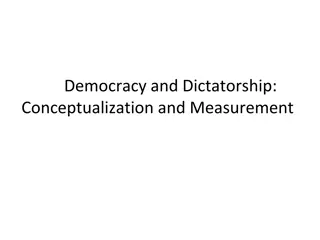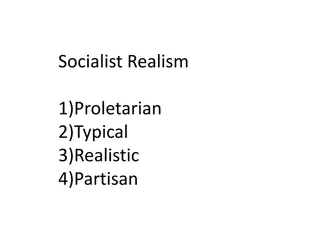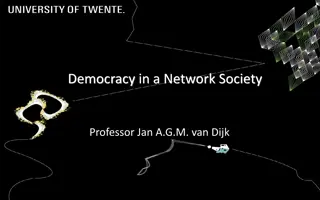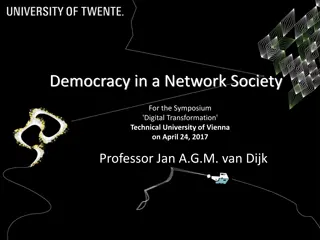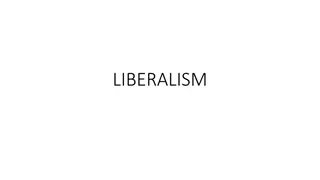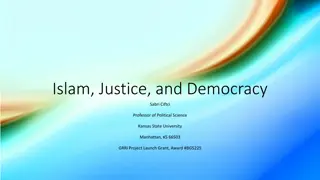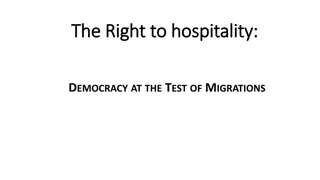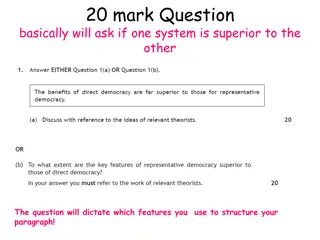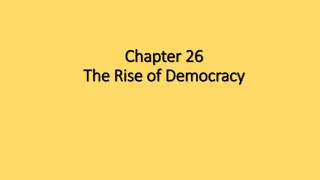Understanding Socialist Democracy: A Political Ideology Explained
Socialist democracy is a political idea that combines elements of democracy and socialism, rejecting capitalism and authoritarian socialism. Proponents advocate for democratic decision-making and public ownership of the means of production. They believe in economic equality, government regulation of the economy, and the limitation of private property accumulation. The practice involves socialism influencing democracy, promoting equality among people, and decision-making by workers through delegate democracy.
Download Presentation

Please find below an Image/Link to download the presentation.
The content on the website is provided AS IS for your information and personal use only. It may not be sold, licensed, or shared on other websites without obtaining consent from the author. Download presentation by click this link. If you encounter any issues during the download, it is possible that the publisher has removed the file from their server.
E N D
Presentation Transcript
The ideal of socialist democracy disagrees with two things. One it disagrees with the compatibility of capitalism and democracy. Two, it disagrees with the notions of authoritarian socialism, which developed in Russia and some places in the. Socialist democracy thus share some ideological roots with communism but rejects its militancy and totalitarianism. Social democracy was initially known as revisionism because it represents some basic change in the basic tenant of Marxism
A socialist democracy is a democracy informed by socialism. It is a political idea which champions democracy within a socially owned economy. The argument of protagonist of socialist democracy is the view that capitalism is incompatible with certain values of democracy, especialy the values of freedom, equality and solidarity (fraternity)
Proponents of the ideal of socialist democracy believe in democratic decision making mode and at the same time public ownership of the means of production. They also believe that socialism must be installed through lawful means rather than by force Socialist democracy adopted the goal of state regulation of business and industry as being sufficient for economic growth and equitable income.
Proponents champion the belief that properties should be owned by the masses through a democratically elected government There is the belief in the limit being set on the accumulation of private property The need for government regulation of the economy
The characteristics of socialist democracy are: Socialism informs the practice of democracy rather than capitalism or even communism The belief in equality of the people championed by the opinion that this should not just be in terms of political equality but must be in terms of economic equality Decision made by the workers through delegate democracy rather than through representativess
States operated by the principle of socialist democracy aim to bring about a broad social restructuring in accordance with the principle of fairness and equality and social justice. The social democratic state is an active participant in, rather than a regulator of, economy. The state helps in rectifying the imbalances and injustices of the market economy.
In a socialist democracy state, the concentration is on ensuring that there is an equitable distribution of wealth with the goal of eradicating poverty and reduction in social inequality. The eradicating poverty and reduction in social inequality is to ensure that people are not turned to pawns in the political realm. Poverty and social inequality will ensure that elections are bought and that the people are at the mercy of the political class. The state will consequently be used as an instrument of oppression.
Liberal Democracy Liberal democracy is a democratic system in which the individual is supreme. Thus, rather than what is obtained in the socialist democracy in which the collective is celebrated owing to the conception of joint ownership of means of production, liberal democracy recognises individuals liberty or freedom. Freedom is not only recognised, but also officially protected. In addition, political power is limited by the rule of law.
In liberal democracy, there is political freedom, equality of all within the polity, election, multiple political party system, separation of powers, independence of the judiciary, checks and balance In addition, there is constitution and constitutionalism. A liberal democracy is one informed by the political ideology of liberalism. Liberal democracy is also referred to as Western democracy. and as such it is a democracy with the principle of capitalism informing the freedom that guides the economic realm with only government playing a regulatory role
Liberal democracy is representative democracy Liberal democracy champions private property, human rights, civil rights, political freedom Liberal democracy is the predominant form of democracy in our world today. This has made Francis Fukuyama to argue that there is an end of history because liberal democracy has defeated other forms of democracy
Liberal democracy has universal suffrage which grants all citizens irrespective of the sex, ethnicity, property ownership, race, age, income, social status or religion. In a liberal democracy people consent to their government through some form of social contract and the government, in turn, is constitutionally constrained to respect individual rights.
Features of liberal democracy include 1. Widespread political participation by adult citizens 2. Secret Ballot frequent and regular elections 3. Broad freedom of individuals 4. Government with separate functions 5. effective guarantee of individual and minority rights with such rights like freedom of speech, press, conscience, religion, assembly, and equality before the law 6.Constitutionalism which ensures limited government.




